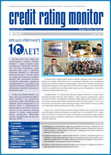Credit-Rating: Systemic crisis not to threaten national economy, yet key figures tumble
Credit-Rating believes that plunge in some key figures, specifically eroded liquidity of the banking system and decreased development rates of some regions do not display the beginning of a deep systemic crisis in Ukraine. The mentioned factors have not so far become systemic and irreversible.
The agency`s monitoring of creditworthiness of entities and their debt obligations shows that the overall specific gravity of investment-grade ratings is constant (36.1% of the overall number as of beginning of the current year and 36.8% as of May 1, 2008). At the same time, during January-April 2008 Credit-Rating downgraded 8 and upgraded 23 ratings (in comparison with 2H2007, which saw 3 ratings downgraded and 63 upgraded). According to Credit-Rating`s CEO Stanislav Dubko, these changes subscribes to the opinion of a certain negative changes in the economy, albeit it does not show irreversibleness of these negative trends.
Thereat, Credit-Rating notes that there is a higher threat to those companies and financial institutions, which development strategies are based upon attraction of significant resources via issuances of securities and loans. The growing interest rates force many investors to prematurely withdraw their funds from the projects, which profitability is currently below the market indicators. The issuers, which have to increase interest rates being unprepared or having no wish to repay the whole amount, shrink their own cash flows. That is why any of alternatives (either repayment of offer or increase in interest rates) pose a threat to issuer`s development, and, thus, may negatively affect its reliability.
1Q2008 saw about UAH1.5bn of bonds called for premature repayment. According to Credit-Rating, in 2Q2008 the option of premature repayment is put in 33 bond series for UAH1.1bn, and 35 bond series for UAH0.9bn in 3Q2008. The ratings of the majority of companies, which offering circulars envisage premature repayment are uaBBB (the lowest investment-grade) 53%, and uaBB (the highest speculative-grade) 21%.
Credit-Rating Deputy CEO
Grigoriy Pererva





